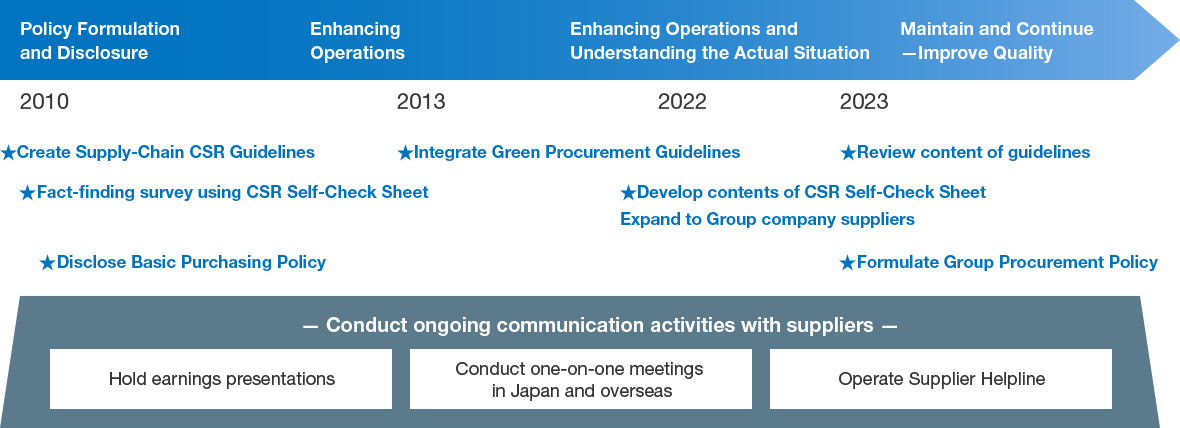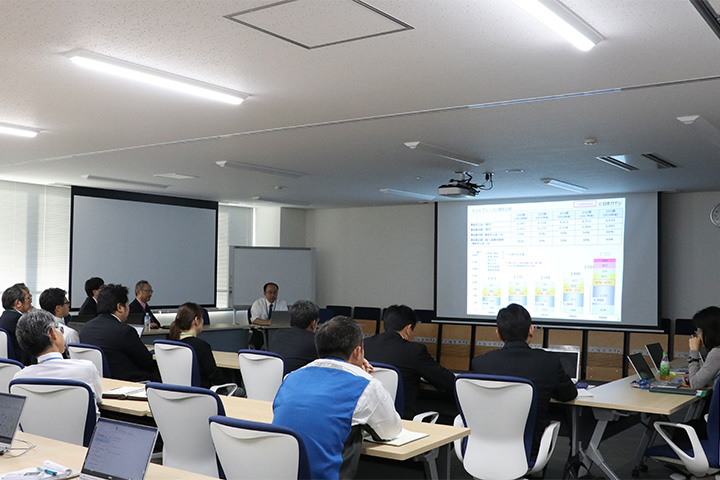Sustainability
Supply Chain Management
Basic Approach
Our policy is based on the three principles of Openness and Fairness, Partnership, and Relationship with Society. In line with this, the NGK Group has established a policy for promoting fair and honest business transactions and helping to ensure prosperous relationships with the suppliers in our supply chain. The NGK Group Procurement Policy codifies the essentials and concrete initiatives.
In 2021 we submitted a Declaration of Partnership Building as advanced by the Cabinet Office Small and Medium Enterprise Agency. We continue to promote partnership with our suppliers as well as fair and honest dealing.
Supply Chain Management Promotion Framework
At NGK, the Purchasing Department is responsible for managing primary suppliers. It also manages secondary suppliers and beyond who provide critical items such as raw materials. We manage approximately 800 suppliers in line with NGK’s Supplier Management Regulations. NGK’s supply chain management initiatives are advanced by the Sustainability Management Committee Supply Chain Subcommittee through coordination and collaboration with related committees and departments in accordance with their details and importance. The Sustainability Management Committee also regularly reports committee meeting details to the Board of Directors.
Promoting CSR Procurement
In response to growing societal demands for CSR in the supply chain, the NGK Group is promoting sustainable procurement. We select suppliers which have CSR initiatives and ESG Management. And we procure materials and services which consider environmental and social impacts.
History of Sustainable Procurement

Supplier Code of Conduct
In FY2010, the NGK Group established the NGK Group’s Supply-Chain CSR Procurement Guidelines which cover the entire Group.
These guidelines not only clarify NGK's own social responsibilities, but make clear what social responsibilities our suppliers should fulfill. This includes wording about reducing greenhouse gas emissions in the environmental dimension.
In FY2013, we integrated the NGK Group Green Procurement Standard, which calls for prioritizing procurement of products and services with a low environmental impact. Thereafter, we added items based on societal changes and new global issues, and in July 2024, we conducted a complete review of the contents and reworked it into the NGK Group Supplier Code of Conduct.
We periodically ask our major suppliers to comply with this code of conduct when starting new projects or continuing current ones.
NGK Group Supplier Code of Conduct
Enhancement of Group-Wide Cooperation and Procurement Capabilities
Within the NGK Group, we work to strengthen the procurement capabilities and ensure good governance for the Group as a whole through a number of approaches, including sharing information among Group companies and undertaking joint initiatives aimed at various procurement matters. Based on each company’s purchasing system and transaction situation, we clarify issues and provide support and reinforcement, such as collective purchasing of common materials, sharing cost and supplier information, and introducing domestic supplier management methods to Group companies.
We will continue expanding the use of collective purchasing, standardizing supplier management methods, and developing other approaches that will contribute to improved procurement functions Group-wide, both in terms of cost and governance.

NGK Group Purchasing Liaison Meeting
Introduction of General Indirect Materials Purchasing System
Typically, each department has performed general indirect materials purchasing, using a piecemeal approach of email, physical mail, and verbal interaction. However, in 2021 we introduced a global transaction network system to centrally integrate indirect materials spending and make it more transparent.
In addition to an expenditure check conducted by the Purchasing Department, we review the supplier, specification, and other details for large-scale expenses based on the available data on a daily basis.
In FY2024, we expanded the scope of this review to the outsourcing of highly specialized work, and are further strengthening management and purchasing.
Supplier Assessment
Identifying Important Suppliers
NGK identifies important suppliers from the following points of view.
- Handling of important items: Raw materials and molding molds for main production items* are considered critical items
- Transaction volume: Accounts for 80% or more of raw materials and molds supply for main production items
- BCP: single company supply ratio of 70% or more
As of March 2025, 37 companies (22 Tier 1 companies, 15 Tier 2 companies) are considered important suppliers.
Main production items: ceramics for purifying automobile exhaust, insulators and related devices for electric power, ceramics for electronic and electrical devices and ceramics for semiconductor manufacturing equipment
New Supplier Assessment
When NGK starts working with new suppliers, we rate them from the perspective of QCD (quality, cost, delivery) and stable procurement based on the principles laid out in our Group Procurement Policy of open, fair, and equitable procurement. In order to fulfill our social responsibilities throughout our entire supply chain, we consider an understanding of and agreement with the essential tenets of the NGK Group Supplier Code of Conduct, which includes ESG elements as a requirement for selection as a new supplier.
Existing Supplier Assessment
NGK periodically asks existing suppliers to submit written consent to comply with our NGK Supplier Code of Conduct. Since FY2021 we have conducted fact-finding surveys consisting of 114 questions across nine topics, including human rights, labor, and the environment. This allows us to perform a detailed CSR assessment of each supplier and assess risk according to transaction details. From the perspective of impact on our business, we first conducted these surveys for direct suppliers of NGK. Now we are gradually expanding them to the main suppliers of our Group companies in and outside Japan. In FY2025, we plan to conduct a full review of the survey contents before conducting the survey.
Main Items in the Assessment
| Main Items | Details |
|---|---|
| Corporate Governance | Promotion framework, internal control, BCP framework, internal whistleblower system, information dissemination both internally and externally |
| Human Rights/Labor | Basic stance; respect for human rights; prohibition and prevention of discrimination/violation; provision of equal opportunities for hiring, training, and career advancement; fair wages, fair implementation of hours and leave; prohibition of forced or child labor; health and safety/health management; freedom of association |
| Environment | Basic stance; chemical substance management; waste reduction; effective resource utilization (water recycling, raw materials recycling) and preservation; prevention of global warming; biodiversity |
| Fair Business Practices | Basic stance; appropriate relationship with government and public officials; preventing inappropriate sharing of benefits with related parties; preventing violations of competition law; elimination of relationships with anti-social organizations; protecting intellectual property and copyrights; relief system; prohibition of insider trading and conflict of interest |
| Quality/Safety | Basic stance; ensuring quality and safety of products and services; appropriate handling of accidents and defective products |
| Information Security | Basic stance; defending against cyber threats; protecting individual data and privacy; preventing unauthorized use of confidential information |
| Co-existence of Supply Chain with Local Communities | Basic stance; initiatives concerning conflict minerals; reducing negative influence on local society; initiatives in cooperation with local society towards sustainable development |
Communication Activities with Procurement Partners
Explanation of Earnings to Suppliers
We hold annual briefing sessions on business performance and policy for our main suppliers, with the goal of facilitating communication. Through these, we explain the state of NGK Group business, our management policy, annual business plan, procurement policy, etc. to our suppliers. In FY2024, 116 supplier companies participated on-site, and approximately 90 companies participated online. We also shared information and goals meant to facilitate the continuation and expansion of business throughout our entire supply chain.
Review and Strengthen Communication with Suppliers
NGK is working to strengthen and improve communication in various points throughout the entire supply chain. This includes requesting regular price negotiations to bring about appropriate price pass-through, and reviewing the methods by which emails are sent and received to improve PPAP issues* in IT security.
Moreover, we regularly exchange opinions with suppliers and introduce them to initiatives on themes such as handling problems with harassment, constructing BCP systems, and IT security.
In addition, we are working to discover and resolve problems in the supply chain early on by establishing a supplier helpline system that allows us to field consultations from both in and outside Japan.
One problem is that the practice of sending and receiving emails with password protected zip files attached is a hotbed for targeted attacks which exploit email.
Visiting and Monitoring Suppliers
In order to ensure procurement from the most appropriate suppliers, NGK visits individual suppliers in and outside Japan to conduct on-site audits and evaluate their QCD (quality, cost, and delivery) performance in a fair and equitable manner. In FY2024, we conducted quality audits at 31 of our existing suppliers, including 11 of our most important suppliers.
Not only did we provide feedback and assessments during these audits, but we also used visits for other objectives such as surveying plants and adjusting delivery times as opportunities to listen to a wide variety of feedback concerning suppliers’ QCD management frameworks, CSR approach, and the state of their organization. In addition to this kind of direct communication with suppliers, we communicate through the web as well to build and strengthen better relationships of mutual trust.
Supplier Training-Driven Support Efforts
The NGK Safety Cooperation Conference hosts meetings for facilities and equipment construction-related supplier members. These meetings are used as opportunities to share accident and disaster case studies, as well as to provide safety-related lectures.
The FY2024 meeting was attended by 89 people from 55 conference member companies. The keynote address was on the topic of safety and good teamwork.
Procuring Resources and Raw Materials Responsibly
The NGK Group conducts procurement activities that consider impacts on regional communities stemming from the use of raw materials (e.g. conflict minerals) with the potential to cause social issues such as human rights violations and poverty, and takes steps to avoid using such materials.
Additionally, in response to requests from customers, we investigate suppliers regarding their responsible procurement of resources and raw materials.
